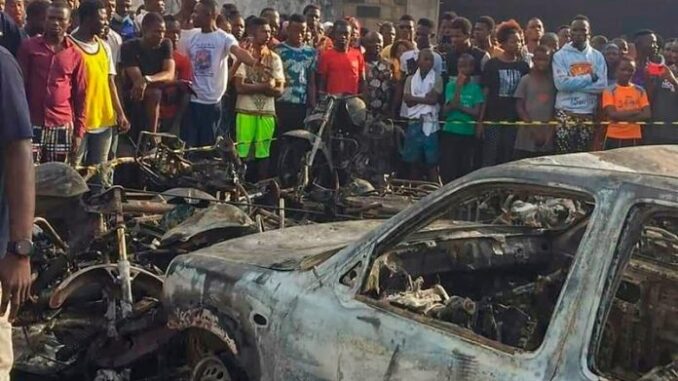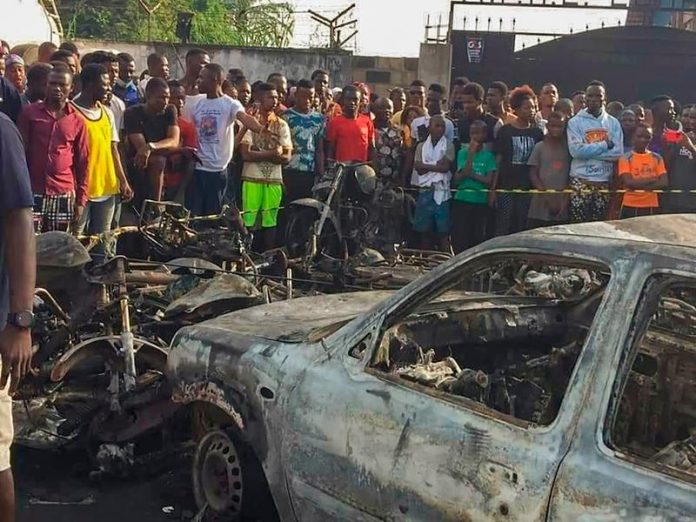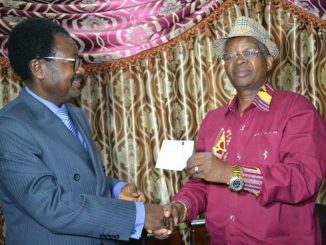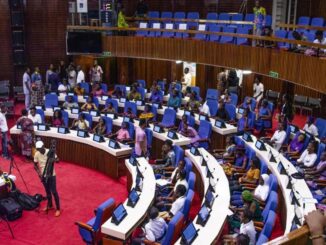
EXECUTIVE SUMMARY OF THE REPORT OF THE INVESTIGATION INTO THE WELLINGTON FIRE DISASTER OF 5TH NOVEMBER 2021
PRODUCED BY THE PRESIDENTIAL TASK FORCE IN MARCH 2021
The Wellington Fire Disaster of 5th November 2021, occurred following a collision between a fuel tanker and a tipper truck carrying granite. The crash resulted in spillage of the petrol from the Bulk Road Vehicle’s (BRV) storage compartment and scooping of the product by some members of the public.
This was followed by a huge explosion forty-two (42) minutes later due to the fuel being ignited from a spark generated from the activities of some members of the public scooping the fuel. The fire, which raged on for close to 5 hours, claimed numerous lives and properties, with a death toll of one hundred and fifty-four (154).
On 26th January 2022, His Excellency the President commissioned a Presidential Task Force to look into the cause(s) of the incident, assess the response of various Ministries Departments and Agencies (MDAs) and other relevant stakeholders to the disaster, draw conclusions and make recommendations for the attention of the Office of the President.
The Presidential Task Force, chaired by the Director General of the National Disaster Management Agency (NDMA) established two (2) subcommittees to carry out the ground work required to fulfill the terms of reference for the assigned task. A number of research instruments considered pertinent and usable by the subcommittees appointed and approved by the Presidential Task Force were used. These instruments included site visits, questionnaires, interviews and reports prepared by various institutions constituting the Sierra Leone Incident Management System (SLIMS).
Following a review of primary and secondary information collected by the Task Force, a number of recommendations were made to prevent the recurrence of similar disasters and improve on the response of the institutions involved in disaster management. The recommendations are discussed in detail in Section seven (7) of this report, but key among them, are the following:
- There is the need to capacitate NDMA in terms of vehicles (light and heavy). It came out clearly in the response that there were delays in moving both the injured and the dead because the NDMA does not hold integral vehicles. The Agency had to rely on partners like the National Emergency Medical Services (NEMS) and the Republic of Sierra Leone Armed Forces (RSLAF) and others to move the dead and those who sustained injuries from the fire incident.
- The fire disaster occurred following the collision between the fuel tanker and the tipper truck, over half an hour before the violent explosion. There was poor communication between security services and the Petroleum Regulatory Agency that has the responsibility for regulating oil marketing companies(OMCs). The need to enhance effective communication among all players in the SLIMS cannot be over emphasized.
- The youths and other members of the public that were involved in scooping of the petroleum product were not aware of the enormity of the hazard posed by their actions. When they were advised to stay away from the scene, most interpreted it as an act of deprivation, purely due to lawlessness. Thus, there is an urgent need to provide sufficient sensitization to the public on the dangers of fuel and gas products.
- The National Fire Force (NFF) is constrained by very limited number of fire fighters. The Force has insufficient personnel, engines, equipment, and chemicals to respond to fire incidents countrywide. Vehicles and equipment available for firefighting, search and rescue operations fall short of the number required to effectively and efficiently discharge the duty of saving lives and properties. The Force is therefore faced with a daunting national task to respond to emergencies with very limited capacity and capability.
- It is noted that NFF has developed a fire safety bill for the country. Slow pace in the approval of this bill is causing lots of challenges for incident management institutions. Thus, it is strongly recommended that the Ministry of Internal Affairs expeditiously initiate engagement with Cabinet and Parliament on the aforesaid bill. This will give the National Fire Force the capacity and leverage to ensure constructive engagement on fire prevention countrywide.
- There is need for improved incident response training and familiarity including cordoning practices for police and responders; this is considered cardinal for implementation of an effective coordination mechanism.
- Insufficient trained Human Resource, vehicles and equipment are common factors requiring urgent attention among several institutions consulted including the NFF, Sierra Leone Police (SLP), Sierra Leone Road Safety Authority (SLRSA), National Disaster Management Agency (NDMA), Freetown City Council (FCC) and Motor Drivers and General Transport Workers Union (MDGTWU).
- A major challenge deduced from the disaster is the absence of a Burns Unit in the country’s health infrastructure. The need for a Burns Unit in the overall arrangement of our national health management system cannot be over emphasized.
In addition to this, there needs to be recruitment and training of burns specialists as well as availability of relevant drugs and equipment.
The Wellington Fire Incident is among the biggest fire disasters to have occurred in living memory in Freetown.
The city has suffered a number of fire incidences in recent years, but the scale of the Wellington petrol tanker disaster under investigation is classed to be among the worst based on the sheer scale of destruction. The level of cooperation and collaboration exhibited by the various institutions involved in the response in terms of coordination, despite the numerous limitations, is worth commending.
As His Excellency the President constituted a multi stakeholder task force to examine the veracity of causes, effects, and management of the entire response, it is anticipated that views in this report together with findings and recommendations will be the beacon of hope for a complete change in terms of approach and strategies by emergency management institutions in the country. Ia devastating petrol tanker fire disaster occurred at Wellington which resulted in the death and destruction of lives and properties.
Your comments and/or observations of the findings by the Presidential Task Force will go a long way to instituting the desired changes to reduce deaths and injuries on our roads in Sierra Leone.




